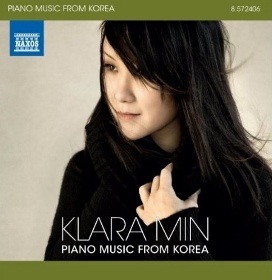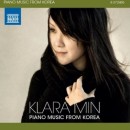[Article first published as Music Review: Klara Min – Pa-mun: Ripples on Water (Piano Music from Korea) on Blogcritics.]
Also featured on seattlepi.com on May 20, 2012.
 In the midst of a dominant Western classical music tradition, Asian classical composers tend to get overlooked, whether it be in live performance or in recordings. Few know that beginning in the 20th century, Korea had a fruitful classical music culture with individuals like Isang Yun being recognized by their Western counterparts as composers of great stature. Many of these compositions were unique for their blend of Western and Eastern influences, as these composers utilized a distinct Western heritage while retaining traditional Eastern elements like scales, different methods of articulation, and more in their compositions. As a Korean concert pianist, I am particularly impressed by concert pianist Klara Min‘s efforts to spotlight works by Korean composers in her recording Pa-mun: Ripples on Water, released on the Naxos label in 2011. The recording is informed by an awareness of these dual influences from the beginning to the end.
In the midst of a dominant Western classical music tradition, Asian classical composers tend to get overlooked, whether it be in live performance or in recordings. Few know that beginning in the 20th century, Korea had a fruitful classical music culture with individuals like Isang Yun being recognized by their Western counterparts as composers of great stature. Many of these compositions were unique for their blend of Western and Eastern influences, as these composers utilized a distinct Western heritage while retaining traditional Eastern elements like scales, different methods of articulation, and more in their compositions. As a Korean concert pianist, I am particularly impressed by concert pianist Klara Min‘s efforts to spotlight works by Korean composers in her recording Pa-mun: Ripples on Water, released on the Naxos label in 2011. The recording is informed by an awareness of these dual influences from the beginning to the end.
According to the program notes, written by Min herself, the composer of title track and opening piece “Pa-mun,” sought to renew Korean musical culture using Western compositional techniques. This piece, composed by Youghi Pagh-Paan, is a soothing musical description of wave reflections on water (the word pa-mun describes the effect of ripples on water). The composer wrote that the organization of the piece is very evocative of the act of throwing small stones onto a surface of a lake, and this is apparent in the opening of the piece: the initially calm tempo and lower range quickly gives way to dissonant and ascending clusters of notes that sound very much like water droplets spreading to create more ripples. The dynamics, superbly controlled by Min, are never overpowering and the ripples, while they may become agitated, never become aggressive either in speed or volume. This piece as an opener colors the rest of the pieces with a contemplative mood.
Read more at blogcritics.org…

